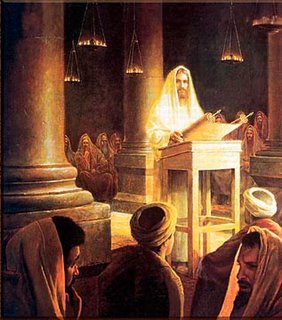On the sabbath Jesus entered the synagogue and taught (Mk 1:21-28)
 Jesus entered the synagogue.
Jesus entered the synagogue.The Jews had only one temple, the temple in Jerusalem. Only there can sacrifices be offered. But they also had houses of prayer, the synagogue.
Elders were in charge of their administration. They were called rulers of the synagogue.
Every Saturday all male Jews gather in the synagogue. There they chant psalms and read passages from the Scripture. Sermons were also delivered. Any competent male could be invited to do this. It was in these instances that Jesus was able to preach in the synagogues.
He taught them as one having authority and not as the scribes.Scribes were men devoted to the study of the Law. They were addressed as "rabbi". They were not priests, but were held in high esteem. They were represented in the Sanhedrin, the highest governing religious body of the Jews. Many of them belonged to the party of the Pharisees. They drew out rules governing many details of daily life called traditions.
Rabbis stayed mostly in Jerusalem and had disciples to whom they imparted the Law and traditions. It was because of this that Jesus was called a rabbi.
Scribes only repeat, interpret and give the opinion of others. But Jesus teaches on his own authority. He says: "You have heard that it was said, "an eye for an eye; a tooth for a tooth. But I tell you this do not oppose evil for evil."
The fact that the evil spirits obey him is another sign of his authority.
In their synagogue was a man with an unclean spiritDiabolical possession is a fact, although it is true that in Jesus' time many forms of sickness were associated with diabolical possession. Epilepsy was among them.
I know who you are – the Holy One of God!Holiness is a divine attribute. The evil spirits recognize the divinity fo Jesus.
Quiet!Why does Jesus forbid the evil spirits from revealing who he really was? The Jews had a wrong idea of the Messiah. They expected the Messiah to be a military leader and ruler like David. But Jesus was not that kind of Messiah and so he did not want to be identified as Messiah.
REFLECTION: THE SYNAGOGUE
We too have houses of prayer, our churches and our chapels. How do we treat our churches and chapels? Are they playgrounds for children? Are they marketplaces? Are they meeting places for lovers? Are they places for rest and sleep? Are they places for gossip?
Are they not sacred spaces dedicated and set aside for God to be with his children?





